Have you ever wanted to amplify the sound of your iPhone, but didn’t want to spend a bunch of cash on a speaker system? Or maybe you’re trying to be as ‘green’ as possible, and don’t want to make your carbon footprint larger with yet another device that requires batteries or AC power… If either are the case, then Griffin’s AirCurve might be a viable solution.
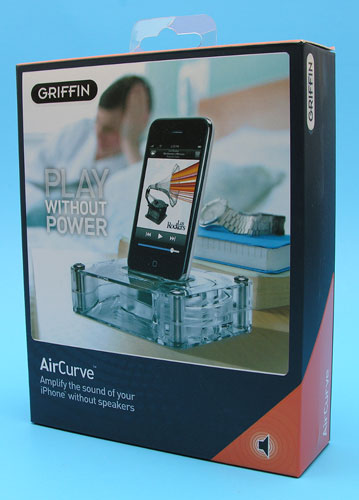
So, what exactly is the AirCurve, if it’s not a speaker system? It’s an acoustic amplifier, that’s what. :o)
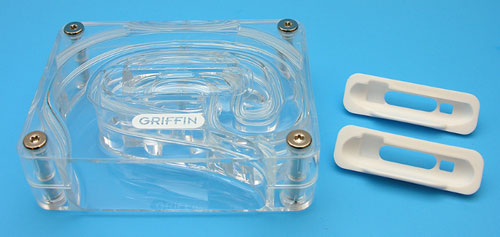
Package Contents
AirCurve
iPhone adapter
iPhone 3G adapter
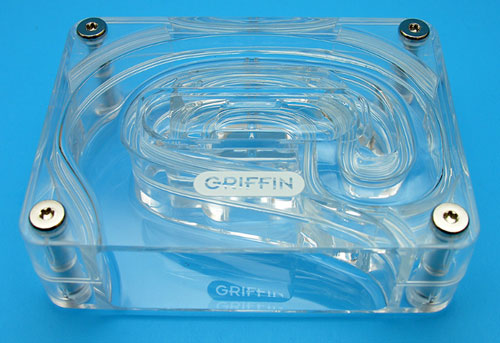
The AirCurve is a 4.75 x 3.625 x 1.375 inch two piece clear polycarbonate box.
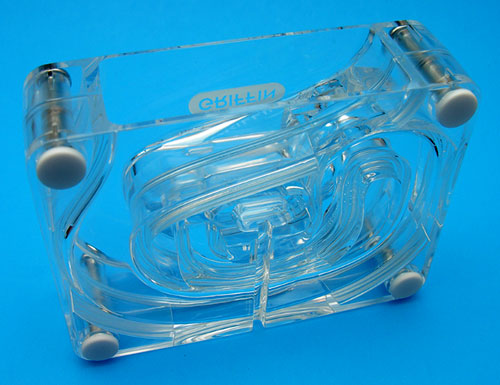
The interior of the box has a custom-engineered waveguide that requires no power to operate. Think of this waveguide like the horn on an old time victrola / phonograph. It starts out with a small opening that funnels sound out through a much larger opening.
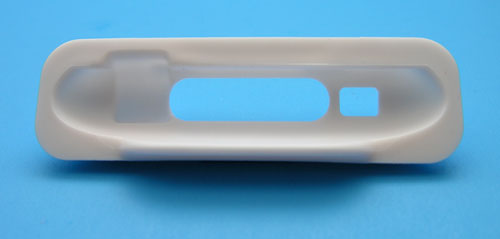
To use the AirCurve, you first have to install the adapter for either the original iPhone, or the 3G iPhone. Unlike other devices that require docking adapters, you actually MUST use one in the AirCurve. If you don’t, the iPhone won’t even be able to stand up in the ‘dock’ area.
Two adapters are included and are both made of semi-flexible White plastic. You’ll notice that there’s an opening for the docking connector and a smaller opening to the side of it. That smaller opening creates a sound tunnel from one of the speakers on the iPhone, through an opening in the AirCurve docking area, through the waveguide channel.
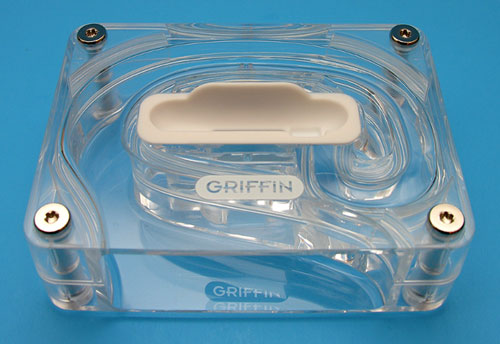
If you like, you can feed the USB cable that came with your iPhone through the AirCurve, so that you can use it as a sync / charge dock. There’s a opening that goes straight through the AirCurve, for this purpose. I tried to use one of my iPod cables for this purpose, but I couldn’t get the USB end of the cable to fit through the opening… I’ve misplaced the cable that came with the iPhone, so I’m not ruling out the possibility that it will fit. Griffin also sells their own cable that you can purchase.
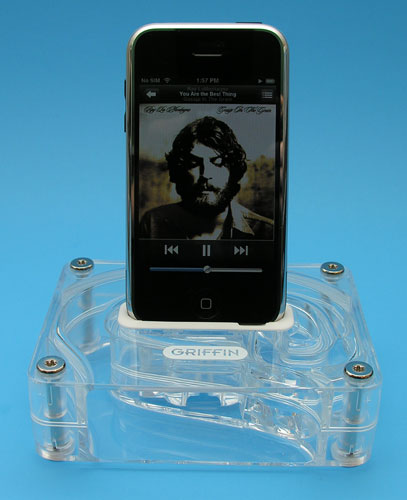
Once the adapter is in place, you can just set the iPhone in it.
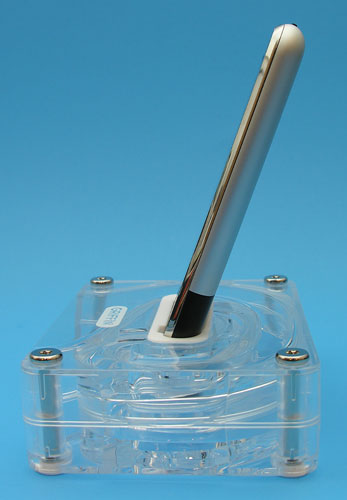
It will balance perfectly without falling over.
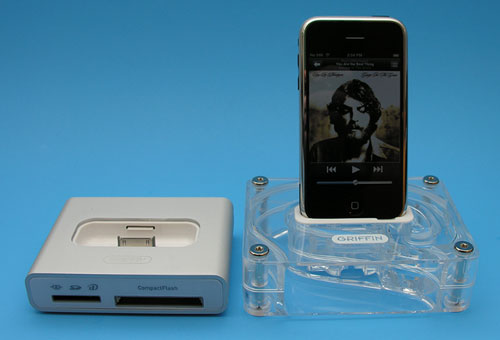
Before I even unpackaged the AirCurve, I was trying to figure out a good way to test it. I knew I could just try it out and tell you my impressions, but I wanted a more technical way to show the results of playing music through the AirCurve vs. playing music without the AirCurve. After a little thought, here’s what I came up with…
I would choose a song to play in the iPod app on the iPhone, and would make a Garageband recording using the BlueMic Snowflake microphone. I would then place the iPhone in a non-amplifying dock-like device (for this test, I used Griffin’s Simplifi USB dock / card reader) and record the same song using the same microphone, setup at the same location. I would then compare the resulting sound waveforms. Brilliant huh? :o)
I have to tell you, that the difference between the two tests were immediately obvious without even needing to look at the recording waveforms. I was really surprised that the AirCurve could amplify the sound volume so drastically without any electronics. Of course, don’t take my word for it, take a look at the results of the recordings…
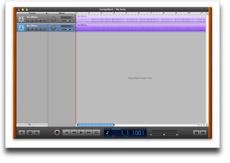
Click thumbnail to see full size screen shot
The top track is with the AirCurve and the bottom track is of the iPhone in the Simplifi. The waveform is noticeably more pronounced with the AirCurve track.
You might wonder if the Simplifi’s dock somehow muffled the sound from the speakers, since they are located on either side of the docking connector. When the iPhone is sitting in the Simplifi dock, it doesn’t sit so low that the bottom of the iPhone touches the bottom of the dock. For that reason, I don’t think using that type of dock was a bad idea.
I also did some tests where I would play music holding the iPhone a few inches above the AirCurve and then sit it in the AirCurve dock for a few seconds, then lift it back up, etc. I could tell an immediate and obvious increase in sound volume through the AirCurve. After doing this numerous times, I came to the conclusion that using the AirCurve doubles the iPhone’s volume level. Setting the iPhone volume to 50% and placing it in the AirCurve, is the sound equivalent to setting the iPhone’s volume to maximum and not using the AirCurve.
You might be wondering if the AirCurve enhances bass or treble. As far as I can tell, it really only increases the volume and doesn’t make the music sound any richer or brighter. So why would you even want to spend $20 on this product, if you could just turn up the volume on the iPhone in the first place? I’ve come up with two reasons. One reason is that cranking the volume up and listening to music through the iPhone’s speakers, will use more battery power. The other reason why the AirCurve might be useful is that it can make a nice stand for your iPhone, if you use it as an alarm clock in your bedroom. It would be super easy to just sit it in the AirCurve’s dock before you go to bed, and then grab it in the morning as you’re going out the door.
The Griffin AirCurve is an interesting product. It might be the first such product I’ve reviewed in the 11yrs that I’ve been testing and writing about gadgets. For $20 it will give you 50% more volume out of your iPhone and will give you an unusual conversation piece as well.
INIU Mini Portable Charger, Small 45W PD Power Bank, 10000mAh USB C in&Out Fast Charging Pocket Size Battery Pack, Travel Essentials Powerbank for iPhone 17 16 15 14 Pro Air, Xiaomi, Samsung S24 etc
15% OffDEWALT Heavy Duty 3-in-1 Mini Stylus Pocket Pen, Tablet Pens for iPad, EDC Touch Screen Pens, Ballpoint w/Touchscreen Tip, Keypad Tip, Compatible iPhone Stylus Pen, Extra Ink Cartridge, Gifts for Dad
15% OffProduct Information
| Price: | 19.99 |
| Manufacturer: | Griffin Technology |
| Requirements: |
|
| Pros: |
|
| Cons: |
|



Gadgeteer Comment Policy - Please read before commenting
I bought one as well, and really like it. I find its most useful for listening to many podcasts – with regards to music, for some reason (despite the testing shown above) – music sounded a little “tinny” to me. Maybe because it just increases volume, and cannot in anyway actually increase the bass.
Overall – really a nice gadget, thanks for the great review!
Nilay:
I haven’t noticed any tinniness to the music when I listen through the AirCurve. At times it might sound a little harsh though… especially if I have the volume too high -before- placing it in the AirCurve.
Podcast listening is a good use for this product :o)
Great idea for a product!
Would definitely be worth it if I owned an iPhone.
sounds like a nice solution for the poor volume on the iPhone 3G.
question, does it also increase the volume for speaker phone input?
i wonder if you can use it with the 2nd generation ipod touch
I tried it as a speakerphone and it didn’t really work well. It amplifies the bottom speaker’s volume, and when I had the iPhone docked in the AirCurve, my friend said he got so much echo back of his own voice it was unuseable in that way.
Yeah, it doesn’t work well while in a speaker phone call.
As for the 2nd generation Touch, I’m not sure as I don’t have one to test. Does it have speakers at the bottom just like the iPhone? If so, it will probably work just fine (as long as one of the speakers line up with the hole in the dock adapter.
It wouldn’t work well for the 2nd gen iTouch because the speaker doesn’t have any holes on the bottom of the device. The speaker is somewhere on the back of the iTouch.
Tyler:
Thanks for the info… I’ve not even seen the newer touch yet. :o)
As a devotee of retro, I love the idea behind this, it’s the same as the Hammacher-Schlemmer Phonofone but $480 cheaper and smaller. But to be truly retro, buy a nice 1920s radio horn with a good driver on eBay and a cheap ($3) Radio Shack audio output transformer, wire the transformer backwards to take a modern iPod/computer audio output to the high impedence old-time-radio standard. The fidelity ain’t great (hell, it ain’t GOOD) but nothing beats having your PC output its audio through a honking big black metal horn. (I have my office radio hooked up to composite woodgrained horn).
Jeff
Jeff:
You’re a crazy man :o) We all need to see a picture of your office radio… Please :o)
Pictures sent!
Here are jpgs of my office horn speakers, the “Radio” one is for the radio (duh),
the “Computer” one is attached to the computer soundcard our-jack (I use
a preamp on the radio output since the tuner output is way low). I do all my
“soldering” with duct tape as I am new to this and mostly avoiding electronics.
But I am already, under the guidance and encouragement of other phono nuts,
learning to disassemble and service wind-up machines (well, not the spring
motors yet, those are tricky, but reproducers and carrage arms).
Radio
Computer
It does NOT work with Ipod Touch (I have the 2G version).
No worky! I wasted mah cash.
go to walmart buy phillips speaker don’t need any power. they use head phone jack (easy to dock the phone) . the sound a lot better
I just bought this this aircurve @ walmart instead of an actual dock- and I love it! I guess Griffin did a little update, because mine also came with a dock well spacer, which helps the usb wire stay in place.
the Apple USB cable does not fit!!!
Technical nit-pick on the review in the last paragraph. If the AirCurve doubles the volume, that’s a 100% increase, not a 50% increase. 😉
Regarding the last comment, the Apple USB cable most certainly DOES fit. You just drop it down from above through the hole. Use the included spacer if you want to make a more permanent connection.
Do you know if the 4th gen ipod touch will work with it?